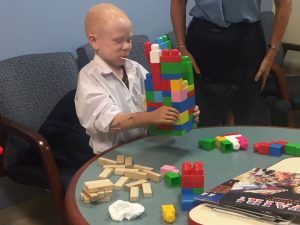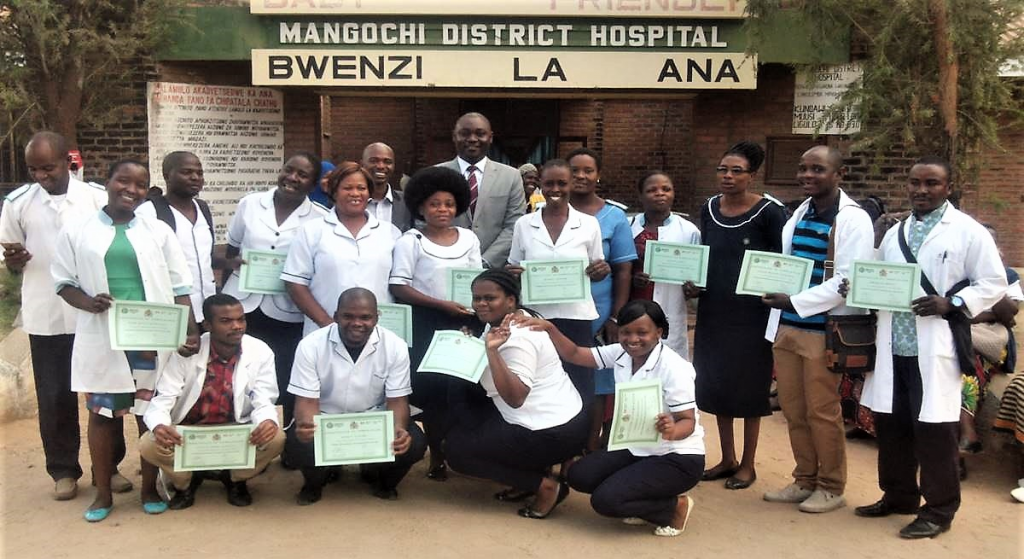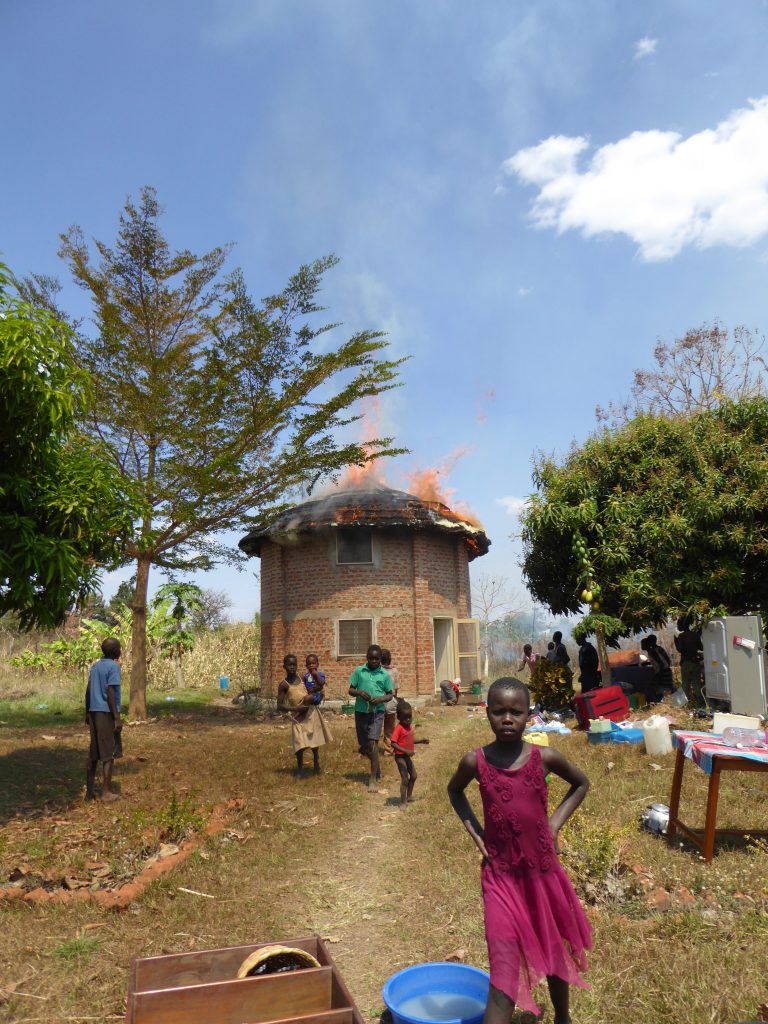By Juju Chang
Victoria Thompson
ABC NEWS:
Baraka and Mwigulu are bunkmates, living in hiding in Tanzania, where they are hunted simply because of how they look.
They weren’t born brothers, but their shared experiences as children with albinism in rural Africa have made them just that.

Baraka, a child from Tanzania whose arm was cut off because he has albinism, plays using his new prosthetic arm
Albinism is a disorder marked by an absence of pigment in the skin, hair and eyes. Tanzania has one of the highest albinism rates in the world, and people with albinism are targeted in heinous attacks motivated by superstition. They are thought to be ghosts or haunted beings.
Mwigulu, now 14, was just 10 years old and living in a rural village when his arm was brutally cut off.
“One day we were coming from school,” he said through a translator. “We saw two people who were walking ahead of us. … One covered my face. And the other one starting cutting me. He cut the first time and he missed … He cut the second time and this time succeeded. Then he took my arm and ran away with it.”
Vicky Ntetema is executive director of Under the Same Sun, a Canadian NGO dedicated to the plight of these persecuted people. She said attacks against albinos are “fueled by ignorance.”
“They think that persons with albinism are not human,” she told “Nightline.” “If there's any disaster, there is drought, there are floods, hurricanes … they are blamed for that.”
The body parts of people with albinism are believed to harness magical powers and Ntetema said local witch doctors will sell them for thousands of dollars.
“The witch doctors are like gods,” Ntetema said. “They tell their clients that bones and other organs of persons with albinism if mixed with a magic potion … will make them successful, will make them win elections, will make their businesses boom, will help even in their love affairs.”
Baraka, now 7, was just 4 years old when Ntetema said attackers broke into his home in the middle of the night and cut off his hand. His mother tried to defend her son and was also injured.
“Baraka himself was screaming,” Ntetema said. “The mother was left alone -- to defend Baraka. She sustained some serious head injuries.
After two and a half years in police custody, three men were sentenced to a combined 62 years for their participation in Baraka's attack. As for Mwigulu, more than four years after he was attacked, six men were sentenced to 20 years apiece for their role in that crime.
Ntetema had previously been a radio reporter for BBC Africa for 18 years. In 2008, she went undercover, posing as a local businesswoman looking to buy albino body parts in an award-winning report.
After the report came out, Ntetema went into hiding and was forced to disguise herself. She left the journalism profession altogether after receiving death threats even, she said, from officials in power.
“The last straw was when the police told me that, ‘If you continue to report … you'll be killed, and we are not going to be there to protect you,’” she said.
In her new role as an activist, she has also helped countless people with albinism, including a woman named Mariamu, who once lived in a remote village in northern Tanzania near the Rwandan border.
ABC News "20/20" first profiled her in 2009. She had been attacked the year before while she was sleeping next to her young son. Both of her arms were viciously cut off. She was left so helpless, her mother had to clothe and feed her, and take care of Mariamu’s young son, Elisha.
Today, the 34-year-old lives in the same safe house as Baraka and Mwigulu and is a foster mother of sorts to them. She received her third set of prosthetics eight months ago in Canada, increasing her self-sufficiency by leaps and bounds. She has even set up a small sewing business in the safe house.
“I feel so happy living with these boys, and yes, it's true, I feel like a surrogate mother,” Mariamu said, with Ntetema translating. “I’ll always speak on their behalf because I am now their voice.”
Mariamu, a devout Christian, regularly takes Baraka and Mwigulu to church with her, where she sings in the choir. When she is singing, Mariamu said she feels like she’s “on Cloud Nine.”
“I’m comforted by the word of God, and that is why I carry on,” she said.
She wants to instill a message of hope in Baraka and Mwigulu, who, like her, have seen such unthinkable cruelty.
This summer, the boys kept that message in mind as they traveled 8,000 miles to New York City as part of a goodwill mission to give them much-needed prosthetic limbs.
They spent three months living at the Dare to Dream House in Staten Island, New York, a home run by the Global Medical Relief Fund, a nonprofit which facilitates treatment for young victims of war or natural disasters who have lost limbs.
Global Medical Relief Fund’s executive director Elissa Montanti has raised enough money to welcome over 200 amputee children over the past 20 years. She has welcomed children from Iraq, Indonesia, Nepal, Liberia and a host of other countries.
“People shouldn’t feel that you need to be a saint to do good things because really any ordinary person can do good,” she said.
Montanti arranged for four Tanzanian children, including Baraka and Mwigulu, to receive their prosthetic limbs from a medical team at the Shriners Hospital for Children in Philadelphia, which services all patients regardless of their ability to pay.
It was the boys’ second time here. They came two years ago for prosthetics which dramatically increased their ability to do day to day activities, but they eventually outgrew them. They will continue to return to Shriners every few years for new prosthetics until their bones are fully set.
The doctors made plaster molds of the kids’ limbs, which were then taken to an on-site lab to be crafted over the course of a few weeks. Mwigulu’s needs were more complicated than Baraka’s.
“For Mwigulu, he doesn’t have his elbow so we need to give him an elbow joint so he can have flex and extension,” said prosthetist Jennifer Stieber.
A few weeks later, the four kids from Tanzania were back at Shriners for the big moment -- receiving their new prosthetic limbs with much anticipation.
“How do you feel?” the doctor asked Baraka.
“Good,” he said. “Thank you.”
Just minutes after trying on his new arm, Baraka was able to grab and stack building blocks with two hands.
“It never gets old, “Montanti said, looking at Baraka. “Think about what’s going on in his head, like he’s kind of put back together -- whole.”
Footnote:
Tim & Rachel Monger Emmanuel International
Tim and Rachel Monger are reps for EI in Mwanza and coordinate the work of EI in partnership with the Tanzania Assemblies of God. Rachel is involved in a brilliant ministry supporting mothers affected by albinism and work with a group of women in Mwanza, Tanzania called “Upendo wa Mama” (Mother’s Love). These mamas have albinism themselves or have children with albinism. Life for many mothers who have birthed children with albinism is often one of fear and rejection. Often rejected by husbands and/or by their family or village, many struggle to provide for themselves and their children and live in fear for the lives of their children. Several have had attempted attacks on their lives or their children. They have been discriminated against because of their children, whom they love with a fiercely protective love. Upendo wa Mama seeks to support these women. The group meets together to support and encourage one another, to work on income-generating projects and to read the Bible and pray together.
To support Rachel Mongers work please donate.
Victoria Thompson
ABC NEWS:
Baraka and Mwigulu are bunkmates, living in hiding in Tanzania, where they are hunted simply because of how they look.
They weren’t born brothers, but their shared experiences as children with albinism in rural Africa have made them just that.

Baraka, a child from Tanzania whose arm was cut off because he has albinism, plays using his new prosthetic arm
Albinism is a disorder marked by an absence of pigment in the skin, hair and eyes. Tanzania has one of the highest albinism rates in the world, and people with albinism are targeted in heinous attacks motivated by superstition. They are thought to be ghosts or haunted beings.
Mwigulu, now 14, was just 10 years old and living in a rural village when his arm was brutally cut off.
“One day we were coming from school,” he said through a translator. “We saw two people who were walking ahead of us. … One covered my face. And the other one starting cutting me. He cut the first time and he missed … He cut the second time and this time succeeded. Then he took my arm and ran away with it.”
Vicky Ntetema is executive director of Under the Same Sun, a Canadian NGO dedicated to the plight of these persecuted people. She said attacks against albinos are “fueled by ignorance.”
“They think that persons with albinism are not human,” she told “Nightline.” “If there's any disaster, there is drought, there are floods, hurricanes … they are blamed for that.”
The body parts of people with albinism are believed to harness magical powers and Ntetema said local witch doctors will sell them for thousands of dollars.
“The witch doctors are like gods,” Ntetema said. “They tell their clients that bones and other organs of persons with albinism if mixed with a magic potion … will make them successful, will make them win elections, will make their businesses boom, will help even in their love affairs.”
Baraka, now 7, was just 4 years old when Ntetema said attackers broke into his home in the middle of the night and cut off his hand. His mother tried to defend her son and was also injured.
“Baraka himself was screaming,” Ntetema said. “The mother was left alone -- to defend Baraka. She sustained some serious head injuries.
After two and a half years in police custody, three men were sentenced to a combined 62 years for their participation in Baraka's attack. As for Mwigulu, more than four years after he was attacked, six men were sentenced to 20 years apiece for their role in that crime.
Ntetema had previously been a radio reporter for BBC Africa for 18 years. In 2008, she went undercover, posing as a local businesswoman looking to buy albino body parts in an award-winning report.
After the report came out, Ntetema went into hiding and was forced to disguise herself. She left the journalism profession altogether after receiving death threats even, she said, from officials in power.
“The last straw was when the police told me that, ‘If you continue to report … you'll be killed, and we are not going to be there to protect you,’” she said.
In her new role as an activist, she has also helped countless people with albinism, including a woman named Mariamu, who once lived in a remote village in northern Tanzania near the Rwandan border.
ABC News "20/20" first profiled her in 2009. She had been attacked the year before while she was sleeping next to her young son. Both of her arms were viciously cut off. She was left so helpless, her mother had to clothe and feed her, and take care of Mariamu’s young son, Elisha.
Today, the 34-year-old lives in the same safe house as Baraka and Mwigulu and is a foster mother of sorts to them. She received her third set of prosthetics eight months ago in Canada, increasing her self-sufficiency by leaps and bounds. She has even set up a small sewing business in the safe house.
“I feel so happy living with these boys, and yes, it's true, I feel like a surrogate mother,” Mariamu said, with Ntetema translating. “I’ll always speak on their behalf because I am now their voice.”
Mariamu, a devout Christian, regularly takes Baraka and Mwigulu to church with her, where she sings in the choir. When she is singing, Mariamu said she feels like she’s “on Cloud Nine.”
“I’m comforted by the word of God, and that is why I carry on,” she said.
She wants to instill a message of hope in Baraka and Mwigulu, who, like her, have seen such unthinkable cruelty.
This summer, the boys kept that message in mind as they traveled 8,000 miles to New York City as part of a goodwill mission to give them much-needed prosthetic limbs.
They spent three months living at the Dare to Dream House in Staten Island, New York, a home run by the Global Medical Relief Fund, a nonprofit which facilitates treatment for young victims of war or natural disasters who have lost limbs.
Global Medical Relief Fund’s executive director Elissa Montanti has raised enough money to welcome over 200 amputee children over the past 20 years. She has welcomed children from Iraq, Indonesia, Nepal, Liberia and a host of other countries.
“People shouldn’t feel that you need to be a saint to do good things because really any ordinary person can do good,” she said.
Montanti arranged for four Tanzanian children, including Baraka and Mwigulu, to receive their prosthetic limbs from a medical team at the Shriners Hospital for Children in Philadelphia, which services all patients regardless of their ability to pay.
It was the boys’ second time here. They came two years ago for prosthetics which dramatically increased their ability to do day to day activities, but they eventually outgrew them. They will continue to return to Shriners every few years for new prosthetics until their bones are fully set.
The doctors made plaster molds of the kids’ limbs, which were then taken to an on-site lab to be crafted over the course of a few weeks. Mwigulu’s needs were more complicated than Baraka’s.
“For Mwigulu, he doesn’t have his elbow so we need to give him an elbow joint so he can have flex and extension,” said prosthetist Jennifer Stieber.
A few weeks later, the four kids from Tanzania were back at Shriners for the big moment -- receiving their new prosthetic limbs with much anticipation.
“How do you feel?” the doctor asked Baraka.
“Good,” he said. “Thank you.”
Just minutes after trying on his new arm, Baraka was able to grab and stack building blocks with two hands.
“It never gets old, “Montanti said, looking at Baraka. “Think about what’s going on in his head, like he’s kind of put back together -- whole.”
Footnote:
Tim & Rachel Monger Emmanuel International
Tim and Rachel Monger are reps for EI in Mwanza and coordinate the work of EI in partnership with the Tanzania Assemblies of God. Rachel is involved in a brilliant ministry supporting mothers affected by albinism and work with a group of women in Mwanza, Tanzania called “Upendo wa Mama” (Mother’s Love). These mamas have albinism themselves or have children with albinism. Life for many mothers who have birthed children with albinism is often one of fear and rejection. Often rejected by husbands and/or by their family or village, many struggle to provide for themselves and their children and live in fear for the lives of their children. Several have had attempted attacks on their lives or their children. They have been discriminated against because of their children, whom they love with a fiercely protective love. Upendo wa Mama seeks to support these women. The group meets together to support and encourage one another, to work on income-generating projects and to read the Bible and pray together.
To support Rachel Mongers work please donate.




Leave a comment
This site is protected by hCaptcha and the hCaptcha Privacy Policy and Terms of Service apply.